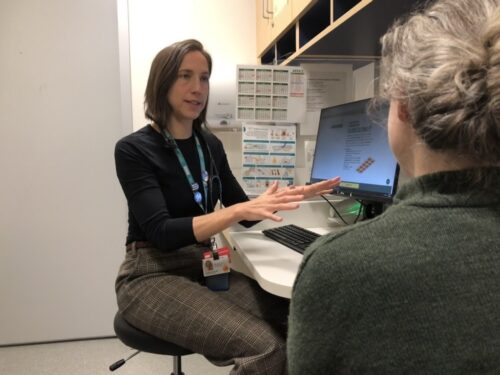Specialized Treatment in Addiction Psychiatry Expands Access to More Patients with Mental Illness and SUD
August 26, 2020
By Meryl Bailey

Getty Images
Opportunities for integrated mental health and addiction treatment could be a significant step in addressing the nation’s overdose crisis.
Recent surveys by the National Survey on Drug Use and Health show mental illnesses are prevalent among people with addiction: An estimated 64% of people with opioid use disorder (OUD) struggle with a mental illness, yet only a quarter of these people receive treatment for both disorders. Providing more opportunities for integrated mental health and addiction treatment could be a significant step in addressing the nation’s overdose crisis, says Michael Dawes, MD, vice chair of addiction psychiatry in the Center for Addiction at Boston University School of Medicine (BUSM) and the Grayken Center for Addiction at Boston Medical Center (BMC).
Understanding the causality of concurrent addiction and mental illness is a modern “chicken and egg” scenario. Beyond the common hypothesis that some people with underlying psychiatric disorders use substances and alcohol as a form of self-medication, genetics and environmental influences likely also play a role, says Dawes, especially for individuals who develop addiction before the age of 25. Emerging research suggests that in some cases, epigenetic changes to DNA (or the modification of gene expression due to environmental factors) can leave people and their offspring more susceptible to developing addictive behaviors and mental illness.
Beyond common conditions like depression, anxiety, and other mood disorders, 1 in 4 people with SUD is thought to have a debilitating, serious mental illness like bipolar disorder or schizophrenia that requires long-term treatment approaches. The stakes are high for identifying and treating people dealing with opioids, alcohol, and other substances as well as mental illness, notes Dawes — effective treatments require an integrated approach because the interplay between the disorders has the potential to exacerbate and perpetuate the progression of both.
“Studies show Massachusetts residents with co-occurring opioid and alcohol use and mental health disorders have a higher risk of relapse and overdose deaths, and are more difficult to treat,” says Dawes. “The risk of fatal overdose is especially high for those struggling with serious mental illness, especially if they also have problems with alcohol.”
A proactive approach: Young adults and co-occurring mental and substance use disorders
Dawes and other experts in the department of psychiatry at BMC and BUSM are expanding services that will provide effective medications and psychosocial treatments to people with substance use disorders (SUDs) and mental illness. The integrated approach aims to improve health outcomes and quality of life for a patient population that has been historically difficult to treat, says Dawes.
The department is implementing systematic screening for substance use to improve the identification of co-occurring substance use disorders in adolescents and adults with mental illness. Supported by a National Institutes of Health-funded Helping End Addiction Long Term (HEAL) grant, this effort will use patient-reported measures and examine the impact of treating psychopathology in adolescents’ and young adults’ future risk of opioid use disorder.
This effort will use patient-reported measures and examine the impact of treating psychopathology in adolescents’ and young adults’ future risk of opioid use disorder.
Most outpatient treatment settings are unprepared to manage comorbid addiction and mental disorders effectively, evidence would suggest. Specialists trained in the diagnosis and treatment of addiction and co-occurring mental health disorders are needed to assess patients and prescribe and manage multiple controlled prescriptions carefully. BMC’s new program will expand access for more people with SUDs and co-occurring mental health disorders, building on the success of the hospital’s Addiction and Behavioral Health Outpatient Recovery (ABOVE) program, which provides outpatient psychosocial treatments and peer support for patients with opioid use disorder and mental illness.
“When the ABOVE program began in 2019, it was the first phase of our long-term strategic plan to break down a siloed healthcare system and provide integrated care for some of our hardest-to-treat adult SUD patients,” explains Dawes. Dual-diagnosed patients with SUD and co-occurring mental health disorders are often homeless and among the highest utilizers of inpatient and emergency room services. “We plan to expand this integrated approach to treat adult patients with alcohol and stimulant use disorders. We believe this intensive outpatient approach will provide better outcomes and quality of life for these high utilizers of hospital services.”
Read more: ABOVE Integrates Care for Mental and Substance Use Disorders »
The new comprehensive program will provide medication management, individual and group psychotherapy, and peer support through recovery coaches. Treatment models will be specifically tailored based on the developmental needs of adolescents, young adults, and mature adults, and supported by addiction psychiatrists, psychiatric nurse practitioners, social workers, peer support, and addiction psychiatry fellows.
The addiction psychiatry team will further expand levels and intensity of addiction treatment using population data and risk indices of high-utilizer populations with addiction and mental illness. The Addiction Treatment Program also plans to expand services beyond BMC’s campus and into the community, with the goal of becoming a nationally recognized treatment program for all patients in need of mental health and addiction treatment.


